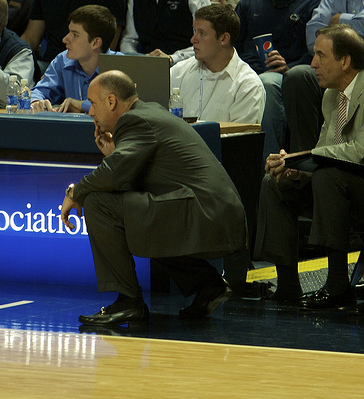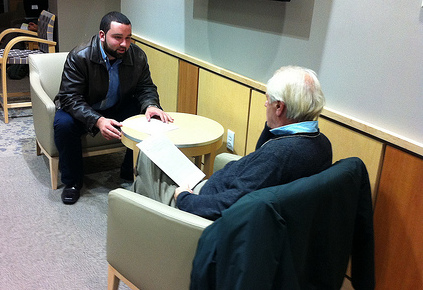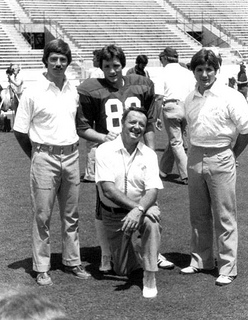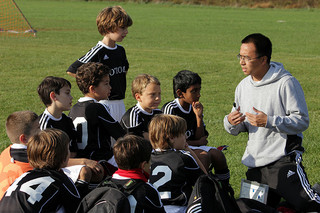 One of the great things about being involved in leadership development and coaching is the opportunity to be constantly learning and developing your own skills in these areas. They say that you teach that which you need to learn the most. Although I don’t subscribe to that theory, there is a thread running through it that resonates within me because of the learning that often goes along with the teaching.
One of the great things about being involved in leadership development and coaching is the opportunity to be constantly learning and developing your own skills in these areas. They say that you teach that which you need to learn the most. Although I don’t subscribe to that theory, there is a thread running through it that resonates within me because of the learning that often goes along with the teaching.
If you’re like most of us, you have probably noticed the buzz word “Coaching” being thrown around a lot in the corporate world. I am a leadership and life coach. But what does it actually mean? Sometimes when dealing with abstract concepts it is easier to define it by describing what it is not.
Coaching is not leading. Leadership Voices, LLC is all about leadership and about the many ways that leadership is defined and employed. And great leaders will often provide guidelines and advice on how to succeed in certain areas. Typically they will be seeking to help you reach a certain goal, or they wish to rally you and your colleagues to reach this shared goal. Great leaders will often also be great coaches; however it is still important to understand the differences in the conversations with them.
 Coaching is not mentoring. If you’ve ever been a coach or have been coached, and the conversation has steered towards advice on technical or job specific concepts, then you aren’t being coached – you are being mentored. Mentoring is defined as, “A situation where a senior or more experienced individual is assigned to act as an advisor, counselor or guide’’ (Business Directory, 2014). Yes, mentoring is crucial in any role, however it is equally as important to understand what mentoring is and why it is being done. Perhaps I will tackle that concept in my next article on this topic that is intimately related.
Coaching is not mentoring. If you’ve ever been a coach or have been coached, and the conversation has steered towards advice on technical or job specific concepts, then you aren’t being coached – you are being mentored. Mentoring is defined as, “A situation where a senior or more experienced individual is assigned to act as an advisor, counselor or guide’’ (Business Directory, 2014). Yes, mentoring is crucial in any role, however it is equally as important to understand what mentoring is and why it is being done. Perhaps I will tackle that concept in my next article on this topic that is intimately related.
Coaching is not managing. If your manager provides a coaching session for you, and gives you advice on ways to perform your role in a greater capacity, gives you ideas on how to make your sales quota, or tells you how to achieve KPIs, then you are being managed. And if your manager does this with you frequently and an in a positive way, then you have a great manager. However, a great manager is not necessarily a great coach. It’s not that they are bad at what they are doing – quite the opposite. It’s just that they are doing what they are employed to do – manage their team members and ensure that they deliver on the targets set by their manager.
So, what is coaching? Wikipedia (that great bastion of irrefutable knowledge) defines coaching this way:
Coaching is a training or development process via which an individual is supported while achieving a specific personal or professional competence result or goal. The individual receiving coaching may be referred to as “coachee”. Occasionally, the term coaching may be applied to an informal relationship between two individuals where one has greater experience and expertise than the other and offers advice and guidance as the other goes through a learning process, but coaching differs from mentoring by focusing upon competence specifics, as opposed to general overall development.
 In a coaching relationship, it needs to be made clear that the coach will not be personally responsible for the coachees acquisition of the new skills or the performance of them. Just as in athletic coaching, it is the athletes who must compete. The coach will work with them, and demonstrate for them, and practice skills with them. But in the game it is the athlete that will compete for the prize.
In a coaching relationship, it needs to be made clear that the coach will not be personally responsible for the coachees acquisition of the new skills or the performance of them. Just as in athletic coaching, it is the athletes who must compete. The coach will work with them, and demonstrate for them, and practice skills with them. But in the game it is the athlete that will compete for the prize.
It should also be understood that coaching may sometimes arrive at what some may consider to be “negative” outcomes (i.e. someone may realize that their current role or environment is not right for them and consequently leave the business or specific enterprise that they are currently leading). These outcomes, however, are more often than not beneficial to both parties in the long term.
How does a coach do it? Effective coaches will ask open-ended questions: How, Why or What? This will quite often uncover issues that the coachee thought weren’t causing the initial problem. For this to be most effective, it is crucial that the coach does not make assumptions in the relationship – this will tend to block any valuable insights being discovered. I learned this technique from my father-in-law. He was an absolute Jedi master at this method of coaching. And I benefitted from his expertise for almost 30 years before he passed away.
Effective coaches will often ask the tough questions that you feel uncomfortable answering. Objectivity and distance affords them this ability. Push someone far enough, and they will challenge their own perceptions. They will, however, not get to this stage until a strong relationship is formed. You probably wouldn’t share your personal feelings with someone you just met – and a coach/coachee relationship is no different.
 I am not the greatest coach in the world by any stretch of the imagination. But I regularly collaborate and fellowship with some guys who are better at this than I am. They are making me better day by day. I have given up the pride that often is rampant in leadership and coaching circles. I am actively engaged in activities that are making me a better leader, a better coach, a better mentor, a better husband, a better father, a better grandfather, a better friend, a better employee.
I am not the greatest coach in the world by any stretch of the imagination. But I regularly collaborate and fellowship with some guys who are better at this than I am. They are making me better day by day. I have given up the pride that often is rampant in leadership and coaching circles. I am actively engaged in activities that are making me a better leader, a better coach, a better mentor, a better husband, a better father, a better grandfather, a better friend, a better employee.
What about you? What are you doing to be better? I am available for 1-on-1 coaching. And I am plugged in with some guys who are available for coaching and are really good at this as well. Take some time and do a little self-examination. Is there an area of your personal or professional life that you want to work on? Reach out to us and we can get you plugged in to some excellent coaching services.
Photo credit: acaben / Foter / (CC BY-SA 2.0)
Photo credit: Merrimack College / Foter / (CC BY-NC-ND 2.0)
Photo credit: State Library and Archives of Florida / Foter / No known copyright restrictions
Photo credit: woodleywonderworks / Foter / (CC BY 2.0)
Photo credit: Jim Larrison / Foter / (CC BY 2.0)



Please note: I reserve the right to delete comments that are offensive or off-topic.